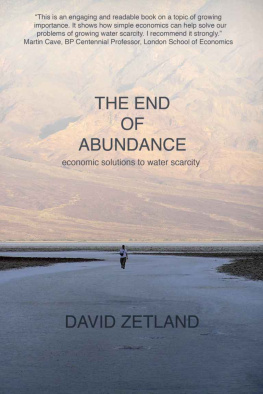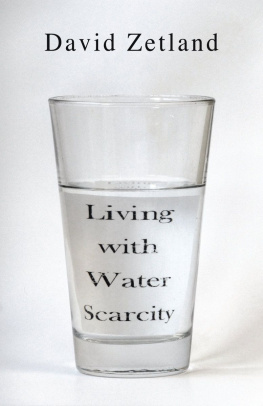Contents
Figures
Tables
Box
Guide
Pages

Water Politics
Governing our most precious resource
DAVID L. FELDMAN
polity
Copyright David Feldman 2017
The right of David Feldman to be identified as Author of this Work has been asserted in accordance with the UK Copyright, Designs and Patents Act 1988.
First published in 2017 by Polity Press
Polity Press
65 Bridge Street
Cambridge CB2 1UR, UK
Polity Press
350 Main Street
Malden, MA 02148, USA
All rights reserved. Except for the quotation of short passages for the purpose of criticism and review, no part of this publication may be reproduced, stored in a retrieval system, or transmitted, in any form or by any means, electronic, mechanical, photocopying, recording or otherwise, without the prior permission of the publisher.
ISBN-13: 978-1-5095-0465-7
A catalogue record for this book is available from the British Library.
Library of Congress Cataloging-in-Publication Data
Names: Feldman, David Lewis, 1951- author.
Title: Water politics : governing our most precious resource / David L. Feldman.
Description: Cambridge, UK ; Malden, MA : Polity Press, 2017. | Includes bibliographical references and index.
Identifiers: LCCN 2016028561 (print) | LCCN 2016043496 (ebook) | ISBN 9781509504619 (hardback) | ISBN 9781509504626 (pbk.) | ISBN 9781509504640 (mobi) | ISBN 9781509504657 (Epub)
Subjects: LCSH: Water-supply--Political aspects. | Water-supply--Co-management. | Water security. | Water resources development.
Classification: LCC HD1691 .F454 2017 (print) | LCC HD1691 (ebook) | DDC 333.91--dc23
LC record available at https://lccn.loc.gov/2016028561
The publisher has used its best endeavours to ensure that the URLs for external websites referred to in this book are correct and active at the time of going to press. However, the publisher has no responsibility for the websites and can make no guarantee that a site will remain live or that the content is or will remain appropriate.
Every effort has been made to trace all copyright holders, but if any have been inadvertently overlooked the publisher will be pleased to include any necessary credits in any subsequent reprint or edition.
For further information on Polity, visit our website: politybooks.com
Preface
A familiar adage of our time is that water is to the twenty-first century what oil was to the twentieth a contested resource for which the fate of entire nations hangs in the balance. Strategic and other comparisons between oil and water are somewhat problematic, however. While disputes over water are growing due to climate change, demands for food and energy that are increasing, and with the advent of mega-cities, nations rarely resort to violence to resolve water conflicts. Moreover, unlike petroleum, which can be exhausted, there is no upper bound to available fresh water if we manage it well.
In many regions of the world such as the Indus, Mekong, or Colorado basins, the need to share over-stressed supplies and to cooperatively manage water infrastructure often leads to collaboration, however precariously. In fact, there are long-standing approaches to conjoint management of water arising out of needs for food, hydropower, and domestic supply (Harrington 2014).
This book analyzes the processes that determine how water issues get the attention of decision-makers, and how disputes over water arise within and between countries. We also examine how varied sources of power: economic, legal, and expert, determine its governance how we allocate, use, and protect it. Finally, we consider the purposes that direct decisions over cost, availability, and access to water. In this wide-ranging analysis, we also provide timely examples from every continent.
Most of all, we consider appropriate arrangements to equitably address water problems. By governance arrangements, we mean combinations of public agencies and civil society entities that cooperate to manage water problems. Among these problems are the challenge of water pollution, one of the worlds gravest health and environmental threats, and that is aggravated by poverty, rapid industrialization, efforts to produce more food, and by newer contaminants of concern that are often beyond the reach of law and regulation.
Special agreements to govern water, such as river basin compacts and confidence building efforts to resolve trans-boundary disputes, are also assessed. And, attention is paid to controversies surrounding desalination, wastewater reuse, rainwater harvesting and other nonconventional supply alternatives. Finally, we examine growing threats to established governance arrangements posed by drought and flood.
introduces a framework for understanding water politics: anchored by process (the interaction of agencies and groups), power (the ability to influence decisions), and purpose (the goals of participants). These are the major factors that determine how water politics is conducted, by whom, and toward what ends.
discusses the political challenges of water supply. We begin with this issue because it is arguably the basis for all other aspects of water politics. Finding, acquiring, and delivering water is of paramount urgency, especially in the worlds burgeoning mega-cities where a plurality of the planets population now resides. These cities are grappling with the means to provide ample, safe drinking water supplies through leveraging resources to improve infrastructure on one hand, while facing the resistance of city residents who are asked to pay for these improvements on the other. It is also an urgent priority for feeding growing populations, especially in developing nations. To comprehend these issues, in urban and rural areas alike, requires that we first understand debates over control, ownership, and marketing of water for all needs.
As important as water supply is, degradation of that supply can undermine efforts to make it readily available. Thus, examines why, despite some 40 years of progress, water quality remains one of the worlds most serious environmental challenges. Following a discussion of quantity with one on quality also makes logical sense, we feel, especially since pollution is a ubiquitous global issue. Cases from the US, France, Russia, and China, as well as recent efforts to remove microbeads from the water environment, utilize natural means of pollution attenuation, and trade pollution rights, are also discussed. In the past half-century, nations have extended water quality protection beyond human health to encompass the environment itself.
discusses the so-called water, food, and energy nexus. Some of the most important debates over water politics revolve around making energy and food more plentiful and affordable, and balancing these goals against the desire to protect water quality; achieve integrated management of these resources; and use hydraulic techniques for energy extraction or fracking. This nexus amplifies many of the political controversies first discussed under water supply and quality.
Climate change and variability is taken up in . We discuss flood abatement, drought alleviation, and recent efforts to manage climate extremes. A growing political challenge is the effort to span local and expert knowledge in managing water and climate. Illustrations from Latin America, the US, and Australia illuminate the effectiveness of this effort. As we will see, it has been complicated by ideologically motivated debate over climate change that impedes long-term collaboration.

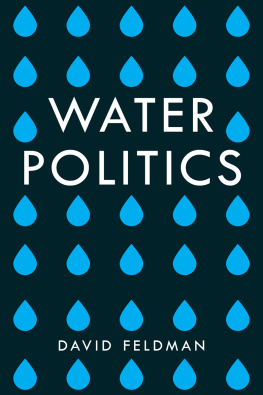

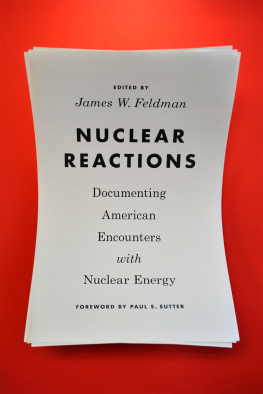

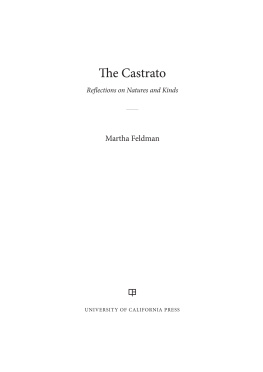

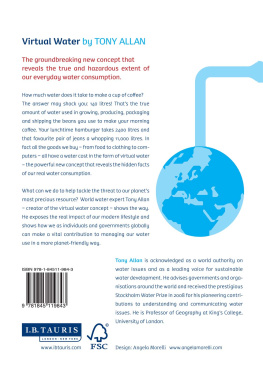
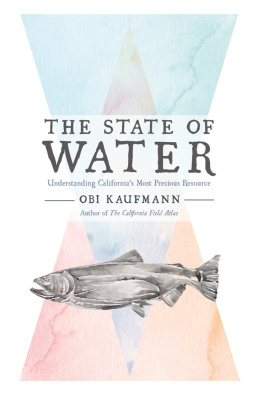
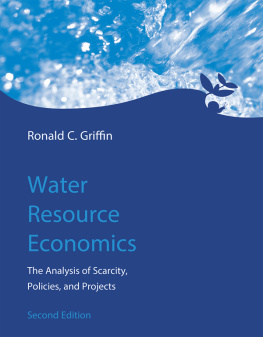
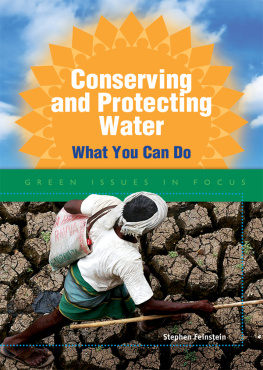
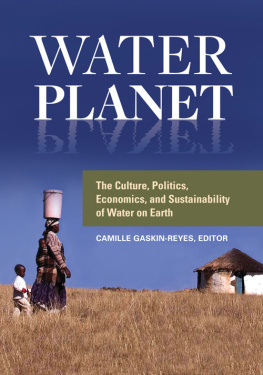
![David E Newton] - The global water crisis : a reference handbook](/uploads/posts/book/104432/thumbs/david-e-newton-the-global-water-crisis-a.jpg)
